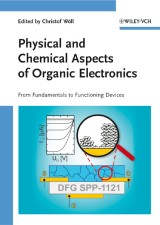Details

Physical and Chemical Aspects of Organic Electronics
From Fundamentals to Functioning Devices1. Aufl.
|
88,99 € |
|
| Verlag: | Wiley-VCH |
| Format: | |
| Veröffentl.: | 22.04.2009 |
| ISBN/EAN: | 9783527627394 |
| Sprache: | englisch |
| Anzahl Seiten: | 698 |
DRM-geschütztes eBook, Sie benötigen z.B. Adobe Digital Editions und eine Adobe ID zum Lesen.
Beschreibungen
Organic molecules are currently being investigated with regard to their application as active components in semiconductor devices. Whereas devices containing organic molecules for the generation of light - organic light emitting diodes (OLED) - have already reached the market (they e.g. display information on mobile phones), transistors where organic molecules are used to actively control currents and voltages are still in the development stage. <br> In this book the principle problems related to using organic materials as semiconductors and to construct functioning devices will be addressed.<br> A particular emphasis will be put on the difference between inorganic semiconductors such as Si, Ge and GaAs and organic semiconductors (OSC). The special properties of such soft matter require particular approaches for processing characterization and device implementation, which are quite different from the approach used for conventional semiconductors.
Part I Industrial Applications<br /> 1 Organic Transistors as a Basis for Printed Electronics<br /> 2 Printable Electronics: Flexibility for the Future<br /> Part II Molecular Compounds<br /> 3 Fluorinated Phthalocyanines as Molecular Semiconductor Thin Films<br /> 4 Novel Organic Semiconductors and Processing Techniques for Organic Field-Effect Transistors<br /> 5 Assembly, Structure, and Performance of an Ultra-Thin Film Organic Field-Effect Transistor (OFET) Based<br /> on Substituted Oligothiophenes<br /> 6 Organic Transistors Utilising Highly Soluble Swivel-Cruciform Oligothiophenes<br /> Part III Structural and Morphological Aspects<br /> 7 Chemical Approaches to the Deposition of Metal Electrodes onto Self-Assembled Monolayers<br /> 8 Growth Morphologies and Charge Carrier Mobilities of Pentacene Organic Field Effect Transistors with<br /> RF Sputtered Aluminium Oxide Gate Insulators on ITO Glass<br /> 9 In Situ X-Ray Scattering Studies of OFET Interfaces<br /> 10 X-Ray Structural and Crystallinity Studies of Low and High Molecular Weight Poly(3-hexylthiophene)<br /> 11 Molecular Beam Deposition and Characterisation of Thin Organic Films on Metals for Applications in Organic Electronics<br /> 12 Fundamental Interface Properties in OFETs: Bonding, Structure and Function of Molecular Adsorbate Layers on Solid Surfaces<br /> 13 Metal/Organic Interface Formation Studied In Situ by Resonant Raman Spectroscopy<br /> 14 Development of Single-Crystal OFETs Prepared on Well-Ordered Sapphire Substrates<br /> Part IV Device Performance and Characterisation<br /> 15 Pentacene Devices: Molecular Structure, Charge Transport and Photo Response<br /> 16 Characteristics and Mechanisms of Hysteresis in Polymer Field-Effect Transistors<br /> 17 Ambipolar Charge Carrier Transport in Organic Semiconductor Blends<br /> 18 Gate Dielectrics and Surface Passivation Layers for Organic Field Effect Transistors<br /> 19 Influence of Metal Diffusion on the Electronic Properties of Pentacene and Diindenoperylene Thin Films<br /> 20 Potentiometry on Pentacene OFETs: Charge Carrier Mobilities and Injection Barriers in Bottom and Top Contact Configurations<br /> 21 Microscopic and Spectroscopic Characterisation of Interfaces and Dielectric Layers for OFET Devices<br /> 22 Scaling Limits and MHz Operation in Thiophene-Based Field- Effect Transistors<br /> 23 Aluminium Oxide Film as Gate Dielectric for Organic FETs: Anodisation and Characterisation<br /> 24 Electronic States at the Dielectric/Semiconductor Interface in Organic Field-Effect Transistors<br /> 25 Aspects of the Charge Carrier Transport in Highly-Ordered Crystals of Polyaromatic Molecules<br /> Part V Novel Devices<br /> 26 Carbon Nanotube Transistors Chemical Functionalisation and Device Characterisation<br /> 27 Contact Effects in Cu(TCNQ) Memory Devices<br /> 28 Organic Field-Effect Transistors for Spin-Polarised Transport
Christof Wöll studied physics at the Georg-August University in Göttingen, Germany, and received his Ph.D. degree from the Max-Planck-Institute for Flow Research in 1987. From 1988 to 1989, he worked as a postdoctoral fellow at the IBM Division in San Jose, USA, researching in scanning tunnelling microscopy of clean and adsorbate covered metal surfaces. In 1992 followed his Habilitation in Physics from the University of Heidelberg, where he lectured in physical chemistry. From 1994 to 1996, Professor Wöll was a Heisenberg Fellow of the Deutsche Forschungsgemeinschaft at the Institute of Physical Chemistry, University of Heidelberg. He has published over 180 articles and is a member of the editorial boards of several journals.
Organic molecules are currently being investigated with regard to their application as active components in semiconductor devices. Whereas devices containing organic molecules for the generation of light - organic light emitting diodes (OLED) - have already reached the market (they e.g. display information on mobile phones), transistors where organic molecules are used to actively control currents and voltages are still in the development stage. <br /> In this book the principle problems related to using organic materials as semiconductors and to construct functioning devices will be addressed.<br /> A particular emphasis will be put on the difference between inorganic semiconductors such as Si, Ge and GaAs and organic semiconductors (OSC). <br />

















